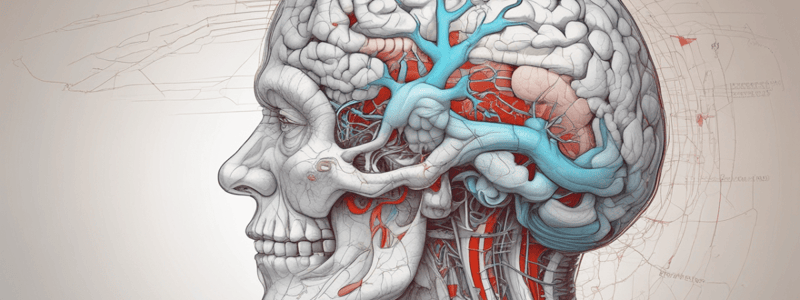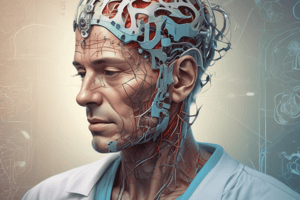Podcast
Questions and Answers
What is the term for the interruption of blood flow to the brain?
What is the term for the interruption of blood flow to the brain?
What is the primary cause of tissue ischemia in ischemic stroke?
What is the primary cause of tissue ischemia in ischemic stroke?
What is the primary function of neurotransmitters in neurons?
What is the primary function of neurotransmitters in neurons?
Which part of the brain controls fundamental functions such as breathing and heart rate?
Which part of the brain controls fundamental functions such as breathing and heart rate?
What is the term for the loss of movement, confusion, and inability to speak in stroke patients?
What is the term for the loss of movement, confusion, and inability to speak in stroke patients?
Why is the airway at risk when the nervous system is depressed?
Why is the airway at risk when the nervous system is depressed?
What is a major cause of seizures?
What is a major cause of seizures?
What is the term for the temporary episode of neurological dysfunction with symptoms resolving within 24 hours?
What is the term for the temporary episode of neurological dysfunction with symptoms resolving within 24 hours?
What may occur if a small amount of blood is still able to reach the affected area of the brain?
What may occur if a small amount of blood is still able to reach the affected area of the brain?
What is the shift of intracranial contents within the cranial vault or displacement of contents away from their normal position inside the skull?
What is the shift of intracranial contents within the cranial vault or displacement of contents away from their normal position inside the skull?
What is the phrase that emphasizes the importance of prompt response to a patient with a potential stroke?
What is the phrase that emphasizes the importance of prompt response to a patient with a potential stroke?
What can cause compression of brain tissue if it rises sharply or falls critically?
What can cause compression of brain tissue if it rises sharply or falls critically?
Flashcards are hidden until you start studying
Study Notes
- Stroke is the fifth leading cause of death in the United States, with treatments varying based on type, whether ischemic or hemorrhagic.
- Ischemic stroke occurs when a blood vessel is blocked, causing tissue distal to the blockage to become ischemic.
- Hemorrhagic stroke results from bleeding inside the brain, with severity depending on location and size of the ruptured cerebral vessel.
- Cerebral blood flow interruption can result from thrombus, arterial rupture, or cerebral embolism.
- Signs and symptoms of stroke include loss of movement, confusion, and inability to speak, with time being crucial in preventing further damage.
- The brain is sensitive to changes in oxygen, glucose, and temperature, with substantial changes resulting in neurological changes.
- Neurons use neurotransmitters to transmit signals across the synapse to other neurons.
- The nervous system consists of the CNS and PNS, with the brain controlling fundamental functions such as breathing, heart rate, and blood pressure.
- The brain has three major parts: brain stem, cerebellum, and cerebrum, with the cerebrum divided into right and left cerebral hemispheres.
- Reflexes that protect an awake person may not function when the nervous system is depressed, putting the airway at risk.
- Altered mental status is a common presentation in patients with various medical problems, including alcohol intoxication, head injury, diabetic emergencies, and stroke.
- Seizures may occur due to an old or recent head injury, brain tumors, metabolic problems, genetic disposition, or unknown causes.
- The brain is responsible for higher-level activities such as memory, understanding, communication, and thought.
- Neurological emergencies include seizures, altered mental status, and stroke, with treatment depending on the underlying cause.
- The expression "time is brain" emphasizes the importance of prompt response to a patient with a potential stroke.
- Infarction may be prevented with prompt care, leading to the restoration of blood flow and affected cells.
- If a small amount of blood is still able to reach the affected area of the brain, it may supply enough oxygen to keep a larger group of brain cells alive.
- Interruption of cerebral blood flow can result in brain dysfunction or other neurologic symptoms.
- Infection and tumor can cause seizures and altered mental status.
- A transient ischemic attack (TIA) is a temporary episode of neurological dysfunction, sometimes called a "mini-stroke," with symptoms resolving within 24 hours.
- TIAs are often a warning sign of an acute stroke in the future, and patients should be evaluated by a physician.
- Signs and symptoms of TIA include facial drooping, sudden weakness or numbness, decrease or absent movement and sensation, and aphasia.
- Aneurysms can occur due to a weakness in one or more arterial layers, leading to a hemorrhagic stroke.
- Hemorrhagic stroke can result in sudden onset of severe headache, patients often describing it as the worst headache of their life.
- Surgical repair may be possible for aneurysms if caught in time, but continued bleeding can cause increased intracranial pressure (ICP) and herniation.
- Herniation is the shift of intracranial contents within the cranial vault or displacement of contents away from their normal position inside the skull.
- Increased ICP can cause compression of brain tissue, and if ICP rises sharply or blood pressure falls critically, patients may experience life-threatening issues.
- There is no prehospital treatment effective in decreasing ICP, and patients should be evaluated by a physician.
Studying That Suits You
Use AI to generate personalized quizzes and flashcards to suit your learning preferences.



